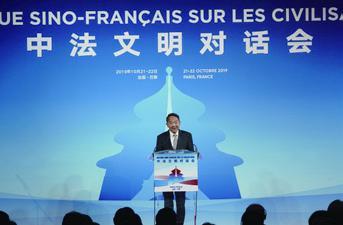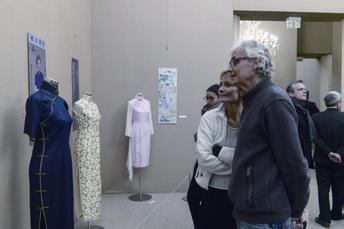Harmony Without Uniformity
2019-11-05ByMaMiaomiao
By Ma Miaomiao


As early as the Renaissance and the Age of Enlightenment in Europe, many French intellectuals, including Voltaire, developed a strong interest in Chinese culture and advocated that Europe should learn from Chinas rationalism. In 1688, French King Louis XIV dispatched royal mathematicians to China. Prominent scholar Gu Hongming (1857-1928), also known as Ku Hung-ming, wrote in his famous book, The Spirit of the Chinese People, that he thought the French understood the Chinese people and civilization best.
These are some of the examples cited by Wang Yi, Chinese State Councilor and Foreign Minister, to illustrate time-honored cultural exchanges between China and France at the Sino-French Dialogue on Civilization in Paris.“For hundreds of years, the two nations have appreciated each other, learned from each other and become a model for exchanges and mutual learning among different civilizations,” he said.
Key agreements
The two-day dialogue ended on October 22 with more than 200 participants reaching consensus that people should cherish and respect every civilization and let the diverse cultures in different countries and ethnic groups bring vitality to the planet.
Both China and France are committed to maintaining the diversity of human civilizations, upholding multilateralism, improving the global governance system, maintaining world peace and stability, and promoting cultural progress, the consensus stressed.
The two countries should take the lead in enhancing dialogue and exchanges, addressing global challenges and promoting sustainable development, the document read.
The dialogue was hosted by Chinas State Council Information Office and organized by China International Publishing Group and the French think tank Bridge Tank, with the participation of senior officials, scholars, representatives from cultural and artistic communities, and business executives.
Dialogue among civilizations
Laurent Fabius, President of the French Constitutional Council, said at the event that both nations are active in preserving the diversity of world civilizations in the spirit of seeking common ground while shelving differences.
In 1964, France became the first major Western country to establish diplomatic relations with the Peoples Republic of China. China set up its first cultural center in a Western country in Paris in 2002.
In March, during Chinese President Xi Jinpings visit to the country, French President Emmanuel Macron presented him with an original French version of An Introduction to the Analects of Confucius. The book was first published in 1688, and the soaring popularity of this Confucian classic in France is another good example of the longstanding cultural communication between the two countries.
According to Wang, the world today is facing great changes that have not occurred in 100 years. As two ancient civilizations, China and France should have a broader mind than the ocean and the sky, so that the light of human civilization of equality, inclusiveness and cooperation can shine forever, he added.
Former French Prime Minister Dominique de Villepin shared a similar view with Wang. Currently, he said, global political, economic, social and international relations are facing crises, which are also reflected in cultural fields. He called on the two countries to play an active role in promoting exchanges among civilizations.
According to Wang, they should persist in treating each other on an equal footing, and let different civilizations show their own beauty. China opposes any theories of the superiority of civilizations or confl ict among civilizations. It advocates respect for the inheritance and development of each countrys civilization, and its right to choose a development path in line with its own national conditions.
Openness and inclusiveness should be adhered to, while all countries should look at other civilizations and the progress of other countries in a rational and inclusive manner. Different countries and civilizations should respect each other, understand, help and accommodate each other, and achieve common development, Wang said.
Cooperation has proved to be the only right choice, self-isolation is anachronistic and unilateralism is unpopular, he added. Under the guidance of proposals such as the Belt and Road Initiative and building a community with a shared future for humanity, China is willing to adhere to and carry forward the concept of multilateralism, deepen cooperation with other countries and make unremitting efforts to promote the overall development and progress of human civilization.
Irina Bokova, Director General of UNESCO, said the Belt and Road Initiative has benefited the world, not only by promoting trade, but also as a driving force for innovation and people-to-people exchanges, adding that the dialogues topics, such as cultural exchanges, protection of cultural diversity and promotion of multilateralism, are of great importance.

